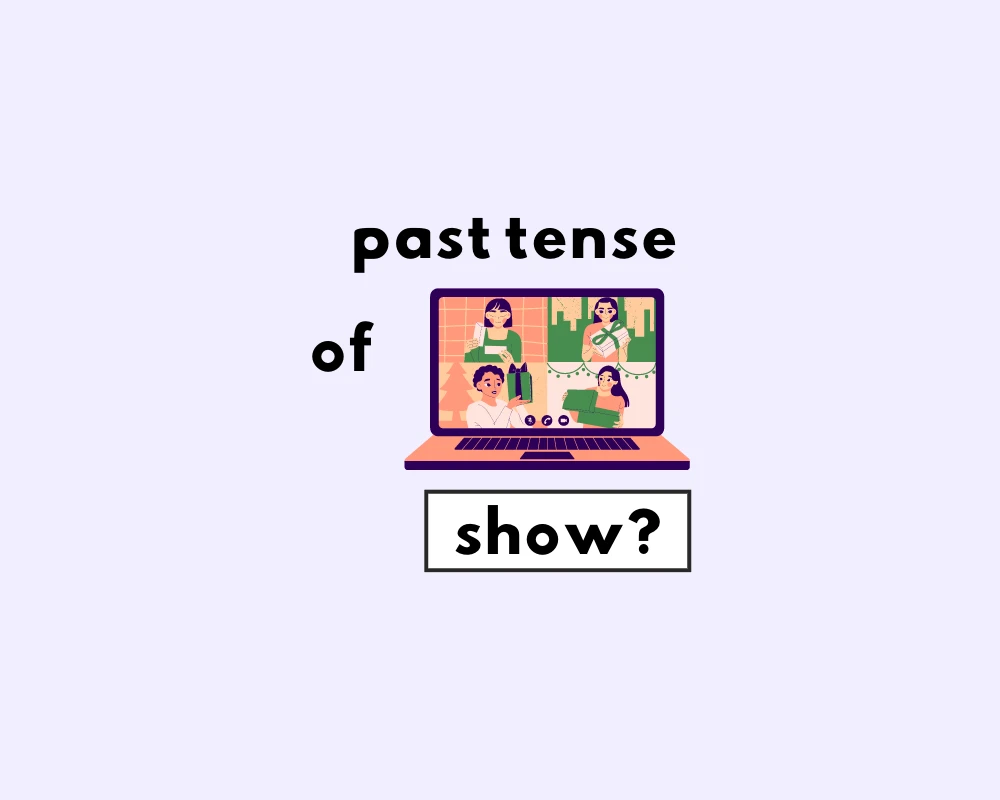
Contents
Toggle
Show, showed, or shown?
How should you know when to use showed vs. shown?
Starting off with a definition, the irregular verb ‘show‘ describes ‘if something shows that a state of affairs exists, it gives information that proves it or makes it clear to people.’ As in, ‘research shows that a high-fibre diet may protect you from bowel cancer‘ (third-person present singular).
The word show can also refer to a noun meaning “a play or other stage performance, especially a musical”. More commonly, people refer to a television show as simply a show.
Forms of “show”
| present | past | future | |
| simple | I show | I showed | I will show |
| continuous | I am showing | I was showing | I will be showing |
| perfect | I have shown | I had shown | I will have shown |
| perfect continuous | I have been showing | I had been showing | I will have been showing |
Showed or shown (which to use when)
simple past: Our research showed us that women were more interested in their health than men.
past perfect: He had shown the house to many potential buyers, but no one would close.
As a broad rule of verb conjugation: participles use helper verbs, such as had and have, in the past perfect and present perfect tenses, respectively.
Simple tense constructions are formed without auxiliaries. So, when we use the past or present participle, showing or shown, we pair it with auxiliaries (such as have/had) to form other tenses in grammar (like the past perfect and present perfect).
“Show”, used in the present tense, in sentences
| Examples: “show“, present tense |
| The government’s popularity is declining, as the polls show. What made you decide to show your paintings? Why did you show me this? You need to show me your new paintings! Let me show you to my study. |
“Showed” / “shown”, used in sentences
| Examples: showed / shown, in sentences |
| Our research showed us that women were more interested in their health than men. He showed me his collection. I could forgive him for what he did if he showed some remorse. We’d shown up exactly on time. He’d shown up with roses and an apology that he had clearly memorized in his head. The drama will be shown on American TV. |
Synonyms of show
- prove
- present
- demonstrate
- display
- illustrate
- sketch out
Practice questions: verb forms of ‘show’
| Questions | Answer options: |
|---|---|
| 1. True or false: “Showed” is a regular verb. | a. true b. false |
| 2. True or false: Regular verbs end in “ed” to denote the past. | a. true b. false |
| 3. True or false: The verb, “show” looks the same in the simple past and as a past participle. | a. true b. false |
| 4. Which tense is this sentence in: He’s shown the house to many potential buyers. | a. past b. present perfect c. past perfect |
| 5. The sentence is in which tense: I’m showing you something that’s really important to me! | a. future continuous b. present continuous c. past continuous |
| 6. Choose the form of ‘show’ to complete the sentence: I can ___ it to you later. | a. showing b. will show c. Show |
Answers:
- a
- a
- b
- b
- b
- c
Idioms with “show”
| Phrase | Meaning |
|---|---|
| show of hands | a method of voting or indicating agreement by raising one’s hand. |
| show the ropes | to teach someone how to do a job or task |
| show off | to open yourself to a variety of options |
| show someone the door | to ask someone to leave or to dismiss them. |
| show the way | to guide or lead someone in the right direction |
| to show no mercy | to be extremely harsh or unforgiving. |
| go to show | to demonstrate or prove something |
| to show one’s true colors | to reveal one’s true character or intentions |
| show-stopper | something that is particularly impressive, captivating or stunning |
| show business | i.e., the entertainment industry, particularly theatre and television |
| to show a clean pair of heels | to run away or escape quickly |
Origin of the word/verb show
From etymology online on show (v.):
Middle English sheuen, from Old English sceawian “to look at, see, gaze, behold, observe; inspect, examine; look for, choose,” from Proto-Germanic skauwojanan* from Proto-Germanic root skau-* “behold, look at,” from PIE *skou-, variant of root *keu- “to see, observe, perceive.”
Other commonly confused verb tenses
- What’s the past tense of spread?
- What’s the past tense of lead?
- What’s the past tense of choose?
- What’s the past tense of fly?
- What’s the past tense of lay?
- What’s the past tense of drive?
- What’s the past tense of draw?
Learn more about verbs
Sources
1. Harper, Douglas. “Etymology of show.” Online Etymology Dictionary, https://www.etymonline.com/word/show. Accessed 7 March, 2023.
2. Definition of show from the Collins English Dictionary










